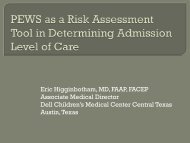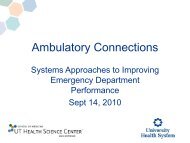COD E R E D
Download - Code Red: The Critical Condition of Health in Texas
Download - Code Red: The Critical Condition of Health in Texas
- No tags were found...
You also want an ePaper? Increase the reach of your titles
YUMPU automatically turns print PDFs into web optimized ePapers that Google loves.
competence. This study, PASS and CATCH, will go into the field in August 2005 in eight Texas schoolsand is funded by the Centers for Disease Control and Prevention.School-Based Nutrition InterventionsSome students may not achieve academic superiority because they are undernourished, thushindering their ability to learn. It has been suggested that even moderate undernutrition can potentiallyhave long-lasting effects on a child’s cognitive development and performance in school (Center onHunger and Poverty and Nutrition Policy, 1998). In addition, research shows that failure to eat breakfastcan have adverse affects on children’s ability to problem-solve in school (Pollitt, 1995; Pollitt et al., 1981;Pollitt et al., 1982). To further reinforce the importance of breakfast and school performance, Meyers,Sampson, Weitzman, Rogers and Kayne (Meyers et al., 1989) tested the hypothesis that low-incomechildren in Massachusetts participating in the School Breakfast Program (SBP) for the first time wouldshow improvements in their standardized achievement test scores. These test scores would becompared with the child’s own performance when no breakfast program was presented. The SBP wasimplemented in 16 elementary schools in the Lawrence school district in late January 1987, prior to thestart of the second school semester of the 1986-1987 school year. Thus, the Massachusetts standardizedachievement test being compared was the one in 1986 when no SBP was in place and in 1987 after theSBP had been operational for three months. Results showed that students participating in the SBP hadsignificantly increased their scores on the battery total scale and the language score. There were alsomarginally greater scores for reading and mathematics (Meyers et al., 1989). Further research in Bostonfound that children who improved their nutritional intake in a school breakfast program decreased theirabsences and improved their math scores, although no improvements were seen for reading, socialstudies or science (Kleinman et al., 2002).More recent studies have documented similar results of higher test scores in nourished childrencompared to their undernourished counterparts (Murphy et al., 1998; Powell et al., 1998). These studiesalso found that the children participating in the SBP had lower absence and tardiness rates than thosewho did not participate in the SBP (Murphy et al., 1998; Powell et al., 1998). Other researchers arefocusing on the child’s social and emotional well-being of being properly nourished and have found thatundernourished children tend to be less active, more anxious and interact less with their classmates andpeers (Barrett et al., 1982; Rampersaud et al., 2005). Schools are a place where children andadolescents socialize with others and develop friendships. An undernourished individual will not have theenergy to participate in school activities with their peers (be it on the playground or in the classroom) andmay become socially withdrawn (Barrett et al., 1982).Since eating patterns and other health-related habits tend to be established in early childhood,(Munoz et al., 1997) and given that schools have the potential to shape and direct the development of thestudents, nutrition education programs implemented and adopted by schools may play a large role inhelping improve a child’s chance for higher academic attainment along with improvements in their healthstatus related to nutritional intake. Many elementary school children depend on school meals, derivingapproximately 50% to 60% of total daily intake of energy, protein, cholesterol, carbohydrate and sodiumfrom school meals (Nicklas & Johnson, 2004). School nutrition programs will be very important in effortsto prevent obesity in children and are also likely to have a positive impact on academic performance.School-Based Asthma Management InterventionsFew school-based asthma management programs have been evaluated. The most rigorousevaluation was conducted by Evans et al (Evans D. et al., 1987) using random assignment of 12 NewYork schools within matched pairs. Participants included 239 low-income predominantly Hispanic andAfrican-American students from 3 rd to 5 th grade who experienced at least three episodes of asthma in thelast year. The asthma self-management program consisted of six 60-minute sessions on asthmamanagement skills for the students and written information on curriculum and activities for the parents.Asthma program students performed significantly better than control students on classroom grades inE-22







